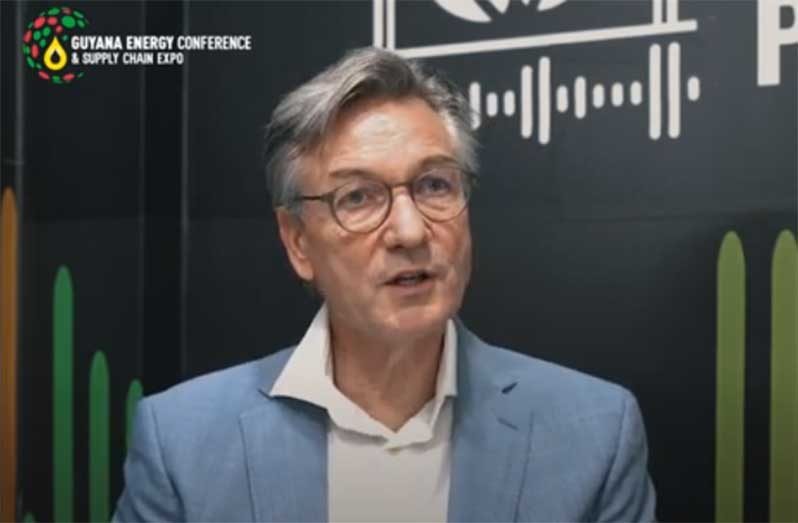…so as to enjoy duty-free, quota-free access
IN an era of increasing globalisation, businesses across the Caribbean Community (CARICOM), including Guyana, have been presented with an exceptional opportunity to tap into European Union (EU) markets.
Speaking to the benefits to be derived from the Economic Partnership Agreement (EPA) between the EU and CARICOM, EU Ambassador to Guyana René van Nes said the pact offers duty-free and quota-free access, the objective of which is to enhance trade relations and foster economic development across the region.
Further highlighting the benefits of this arrangement, Ambassador van Nes, whose forte is Macro Economics and Public Finance, shared some invaluable insights during the latest episode of the Energy Perspectives podcast, which is being powered by the Guyana Energy Conference and Supply Chain Expo.
He explained that products made in the Caribbean can be exported to the European Union without paying any tariffs or being subject to import limits. “And with that comes a whole package of promotions; trade promotions and assistance to make sure that these difficult EU rules, which also apply to European producers, can be met here [Guyana] as well,” he said.
Despite the EPA’s immense potential, van Nes recognised that its benefits are not widely known. With its rapidly growing economy, buoyed by the burgeoning oil-and gas sector, Guyana is uniquely positioned to take advantage of the EPA, particularly as it strengthens ties with European markets. Ambassador van Nes revealed a striking statistic: “In 2023, about half of Guyana’s oil was actually bought by the European Union,” he said.
He highlighted that this growing partnership underscores the strategic significance of the EPA, and as the EU seeks to reduce its reliance on Russian oil, he said, emerging oil-producing nations like Guyana are poised to reap substantial benefits.
The ambassador also highlighted several key strengths of Guyana’s investment climate.
Firstly, he said that its abundance of natural resources, including oil, forests and biodiversity, offer significant potential for development. However, transforming these opportunities into tangible results requires adequate financing, he noted. Additionally, he emphasised the need for a willing and capable workforce. Most importantly, van Nes emphasised the role of a dynamic government with a clear vision, such as the Low-Carbon Development Strategy (LCDS) 2030, and the ability to implement that vision through concrete actions. “All of that creates a very conducive environment for countries to operate, as you know what you are getting into,” the Dutch national said.
The ambassador pointed out that Guyana is making significant efforts to strengthen its institutions, recognising their crucial role in the country’s development. He referenced the recent Nobel Prize in Economics, awarded to researchers who concluded that successful nations are those that have established robust institutions capable of supporting and sustaining their growth.
In this regard, van Nes, who’s not only fluent in his native Dutch but is also conversant in English, German and French, pointed out: “That is why I am happy to see that the government [of Guyana] is investing in its people; in its institutions. Because that strength will be absolutely crucial in accompanying Guyana’s growth over the coming years…”
Guyana’s trade relations with the European Union have strengthened, marked by increased exports. Between January 2017 and September 2023, trade amounted to US$11 billion.
Trade grew by 778 per cent between 2021 and 2022, a movement from US$614 million to US$5.4 billion, largely on account of developments in Guyana’s oil-and-gas sector.
Guyana and the European Union established diplomatic relations in 1975 with the signing of the historic Georgetown Agreement.
Since then, the EU has remained a vital development partner for Guyana, providing funding for numerous programmes over the years to support the country’s growth.





.jpg)








